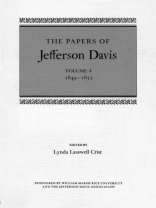May Seaton Dix, Associate Editor Richard E. Beringer, Visiting Coeditor In Volume 4 of The Papers of Jefferson Davis, which covers the years 1849 to 1852, Davis had clearly chosen politics ar his life’s work. He relished in his role as Mississippi’s senior senator and willingly assumed the responsibility of being a national spokesman for the South. This period also saw a number of events in Davis’ personal life, notably the birth of his first child and the beginning of a long estrangement from his brother Joseph.In January, 1849, Davis signed the Southern Address, although he occasionally disagreed with the extreme positions of its author, John C. Calhoun. Outside the Senate, Davis supported the objectives of the Nashville Convention and, later, the idea of a southern congress. During the crisis of 1850 Davis spoke often on such key issues as the regulation of slavery in the territories, the extension of the Missouri Compromise line, the admission of California, the Texas-New Mexico boundary, the continuation of the slave trade in the District of Columbia, and the Fugitive Slave Act. In 1851 he proposed purchasing camels for military transportation and urged that a Pacific railroad route be considered in the definition of the Mexican boundary.As a loyal Democrat, Davis had supported Lewis Cass in 1848, but he was a conspicuous personal favorite of Zachary Taylor, the new Whig president and his former father-in-law. In 1850 Taylor reportedly intervened to prevent a duel between Illinois representative William H. Bissell and Davis, who was incensed by Bissell’s remarks about the Mississippi regiment at Buena Vista. Soon after joining the Taylor family at the president’s deathbed in July, 1850, Davis defended Taylor’s Mexican War performance in well-publicized Senate speech. Between sessions in 1849 Davis canvassed Mississippi, addressing gatherings throughout the state in favor of congressional candidates. He warned of northern aggressions, yet urged the exhaustion of all means of peaceful resistance before secession be considered. When he returned home after the arduous 1850 session, he defended his course, denying charges that he was a disunionist.In February, 1850, Davis had been reelected to the Senate for a full six-year term, but in September, 1851, he resigned to accept the Sate Rights nomination for governor in opposition to Union nominee Henry Foote. Although illness precluded much active campaigning in the few weeks before the election, Davis substantially reduced the Union lead and lost by a narrow margin. A private citizen for the first time since 1845, Davis continued his involvement in politics. Despite nagging personal problems and ill health, he promoted Democratic unity and took to the stump for Franklin Pierce in 1852.
Jefferson Davis
Papers of Jefferson Davis [PDF ebook]
1849-1852
Papers of Jefferson Davis [PDF ebook]
1849-1852
Beli ebook ini dan dapatkan 1 lagi GRATIS!
Bahasa Inggris ● Format PDF ● Halaman 472 ● ISBN 9780807158708 ● Penerbit LSU Press ● Diterbitkan 1983 ● Diunduh 3 kali ● Mata uang EUR ● ID 5061311 ● Perlindungan salinan Adobe DRM
Membutuhkan pembaca ebook yang mampu DRM












